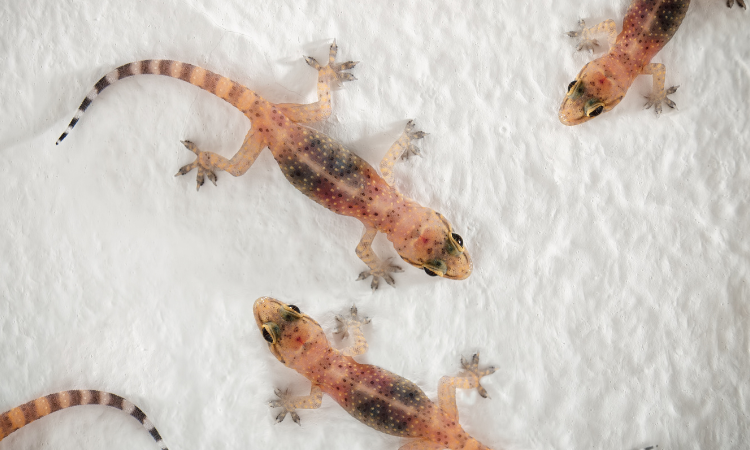Often, leopard gecko owners ask the question: Are mealworms bad for leopard geckos? The answer is complicated. Mealworms are a common food for many pet reptiles, but some owners worry that they may be harmful to their geckos. Let’s take a look at the pros and cons of feeding mealworms to your gecko.

Are mealworms a good choice for Leopard Geckos?
Leopard geckos are popular pets among reptile enthusiasts due to their docile nature and ease of care. As a reptile species, their diet consists mainly of insects, with mealworms being a commonly fed option.
However, there has been some debate over whether or not mealworms are bad for leopard geckos. In this blog post, we will explore this topic in-depth and provide you with the information you need to make an informed decision about feeding mealworms to your leopard gecko.
Leopard geckos require a varied diet
Firstly, it is important to note that leopard geckos require a varied diet to maintain their health. While mealworms can be a part of their diet, they should not be the only insect that they are fed. A balanced diet for leopard geckos should consist of a variety of insects, such as crickets, Dubia roaches, and waxworms.
Mealworms have a tough exoskeleton that can be difficult for geckos to digest
Now, let’s address the concern over whether or not mealworms are bad for leopard geckos.
One of the main concerns with feeding mealworms to leopard geckos is that they have a tough exoskeleton that can be difficult for the gecko to digest.
However, this is not necessarily a problem if the mealworms are gut-loaded and/or dusted with calcium powder before feeding. Gut-loading involves feeding the mealworms nutrient-rich foods, such as fruits and vegetables, to increase their nutritional value.
Calcium powder should be added to the mealworms to ensure that the gecko is getting the calcium they need for healthy bones.
This is the calcium supplement I use for my geckos – it is cheap, good, and lasts forever!

Mealworms are high in fat, which can lead to obesity
Another concern is that mealworms can be high in fat, which can lead to obesity in leopard geckos. While it is true that mealworms are high in fat compared to some other insects, they can still be a part of a balanced diet if fed in moderation. It is recommended to feed mealworms as a treat, rather than a staple food source.
Mealworms can carry parasites or diseases
In addition, it is important to ensure that the mealworms you are feeding your leopard gecko are of high quality. Mealworms that are not properly cared for can carry parasites or diseases that can be harmful to your gecko. It is best to purchase mealworms from a reputable supplier or breed your own to ensure their quality.
Mealworms can be fed in moderation provided they are supplemented with calcium powder
Mealworms can be a part of a healthy and balanced diet for leopard geckos if fed in moderation and supplemented with calcium powder. They should not be the only insect that they are fed, and a variety of insects should be included in their diet.
As with any food source, it is important to ensure that the mealworms are of high quality and properly cared for. With these considerations in mind, mealworms can be a great addition to your leopard gecko’s diet.
Drawbacks of feeding mealworms to your gecko
While mealworms have an important role in a leopard gecko’s diet and should, therefore, be included in their staple food, there are some drawbacks that come along with them.
Mealworms tend to be larger than other insects commonly found in a reptile’s diet like crickets, which can be harder for smaller geckos or young geckos to digest and cause digestive issues.
Additionally, they are higher in fat than other feeder insects; while some fat is necessary for leopard geckos to thrive, too much can also lead to health problems such as obesity.
While mealworms can form an important part of a leopard gecko’s diet, it is important that they are fed responsibly and in moderation.
The pros and cons of feeding mealworms to leopard geckos
Feeding mealworms to leopard geckos can be a beneficial and exciting experience for gecko owners. Mealworms provide geckos with necessary proteins for growth and energy, making them a great main diet for geckos. Furthermore, geckos are known to love their crunchiness!
However, mealworms must always be given in moderation so that geckos do not become overweight, as they contain higher amounts of fat compared to other forms of food. Additionally, providing variety in their diet is important since these worms lack important vitamins and minerals needed for gecko development.
So, while feeding mealworms to geckos may offer some benefits, careful consideration should be taken when deciding the best meals to feed gecko’s that will keep them healthy and aid in their overall growth.
The potential risks associated with feeding mealworms to leopard geckos
Leopard geckos are omnivores that enjoy a diet of live invertebrates such as mealworms. However, when considering offering mealworms as part of your gecko’s food items, there are potential risks to keep in mind.
Feeding mealworms that have not been gut-loaded can contribute to calcium deficiencies, whereas overfeeding any type of prey item could result in obesity and GI tract impactions. It’s also important to consider that improper storage or handling practices for the mealworms could pass on parasites and bacteria to geckos.
Therefore, it’s important to make sure the mealworms provided for your gecko are from reliable sources with proper storage practices.
Additionally, dusting the worms with supplements before being given as food will ensure they are providing proper nutrition to geckos as part of their feedings.
Advice on how to properly care for a leopard gecko if they are being fed mealworms
If you have decided to feed your leopard gecko mealworms, it’s important to keep in mind that, like all geckos, they need a balanced and varied diet. In addition to providing live mealworms, offer a variety of other calcium- and vitamin-rich invertebrates such as crickets, wax worms, superworms and butterworms.
Be sure to dust the invertebrates with a supplement powder containing calcium and other essential vitamins prior to feeding your gecko. If you choose commercially produced mealworm diets for geckos, supplement with fresh produce such as collard greens or squash to make sure your gecko is receiving proper nutrition.
Furthermore, use a shallow water bowl for your leopard gecko that has been filled with dechlorinated water and change it regularly. Following these steps will ensure your gecko stays healthy and well-fed!

Why mealworms are fine for geckos provided you keep this in mind
Geckos are fascinating creatures, and a recent blog post explored their many unique attributes.
In conclusion, the decision to feed your leopard gecko mealworms or not is a personal choice and should be based on informed research. While mealworms are a readily available nutritional food source for the gecko, it should not be its only source of nutrition.
Mealworms have risks that could affect your leopard gecko’s health, both short and long term. If you choose to feed mealworms, make sure to dust them with a calcium supplement to provide your leopard gecko with enough of the vitamins and minerals it needs.
It’s also important to limit mealworm consumption and avoid overfeeding. Remember that variety is key when it comes to feeding leopard geckos; therefore, don’t rely solely on mealworms in their diets but introduce other insects as well.
Ultimately, proper care and understanding of what your pet needs will allow them to live comfortably in captivity.
Related posts:

Hi – I’m Erika, the lead gecko enthusiast here at Geckopedia! I write articles about pet geckos, including what to feed your leopard gecko and how to help your pet gecko live a long, happy life! I graduated with advanced degrees from UC-Berkeley, the University of Southern California (USC) and Indiana University-Bloomington, where I studied Biology and Animal Science. I use my experience to help others learn about gecko care, and I am an advocate for all topics gecko related!
